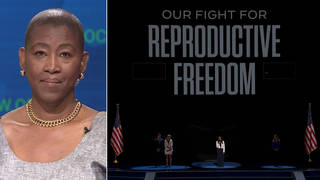
Voters supported the right to abortion in at least four of the five states where reproductive rights were on the ballot in Tuesday’s midterm elections. “Abortion rights are deeply popular, and when you put the question before voters, they say yes,” said The Nation’s Amy Littlefield. She also discusses Vermont becoming the first state to enshrine abortion rights in its constitution, as well as the “historic win” in Kentucky, where voters defeated an anti-abortion ballot initiative.
Transcript
AMY GOODMAN: This is Democracy Now! I’m Amy Goodman, with Juan González.
In at least four of the five states where reproductive rights were on the ballot, voters supported protecting the right to abortion and rejected new restrictions. On our election night special Tuesday, Juan González and I spoke to Amy Littlefield, abortion access correspondent at The Nation. I began by asking her about Vermont becoming the first state to enshrine abortion rights in its constitution.
AMY LITTLEFIELD: History has been made in Vermont in more ways than one. I mean, this is absolutely incredible, early in the evening results coming in that Vermont has enshrined not just the right to abortion but the sweeping right to personal reproductive autonomy into their state constitution. And that includes the right to access birth control, the right to access or to refuse sterilization, you know, because of this robust and long and tragic history of forced sterilization of women of color, of people of color in this country. And it includes the right to be pregnant and have support when you want be pregnant, and to have an abortion when you want to have an abortion. This is the first time we have seen a state proactively enshrine that right into a constitution. I mean, think about what a different place we would be in — right? — if that was enshrined in the U.S. Constitution.
Two other states are considering similar measures. And, you know, it’s early on, but I would predict, because abortion is such a popular issue, I think Michigan and California, the other two states, are likely to pass these similar measures to enshrine this robust right to reproductive autonomy into their state constitutions. Of course, the state where it matters the most is Michigan, because Michigan has a 1931 abortion ban still on the books. It’s been held up by a court, so it’s not in effect. The Democratic governor who’s currently in place, of course, Gretchen Whitmer, doing everything in her power to try to save abortion access in her state, but it would be a hugely powerful and consequential message if the people of Michigan voted in favor of this constitutional amendment that’s on the ballot there. So, those are three that I’m watching very closely.
And then we have Kentucky, Amy. And I am just obsessively refreshing the results right now, waiting to see if this race is going to be called. Kentucky, one of the reddest states in the country, a state that is already living under an abortion ban — right? — has on the ballot an anti-abortion measure, similar to the one that we saw in Kansas over the summer, that would sort of make permanent the existing abortion ban in the state by saying there is no right to abortion in the Kentucky state Constitution. And it looks like voters there are rejecting this measure. I mean, early results are showing a pretty resounding rejection of this anti-abortion amendment in deep red Kentucky.
AMY GOODMAN: The Nation's abortion access reporter Amy Littlefield, former Democracy Now! producer, referenced the Michigan Proposal 3 enshrining a constitutional right to reproductive freedom. The New York Times' latest update is that with 84% of votes counted, the measure is ahead with 55% of the vote. Meanwhile, Protect Kentucky Access, which worked to defeat Kentucky’s proposed anti-abortion amendment, called the win “historic” and said in a statement, quote, “Not only does it represent a win against government overreach and government interference in the people of Kentucky’s personal medical decisions, it represents the first time so many different organizations have come together with such an intense single-minded purpose to defeat a threat of this magnitude,” unquote.













Media Options